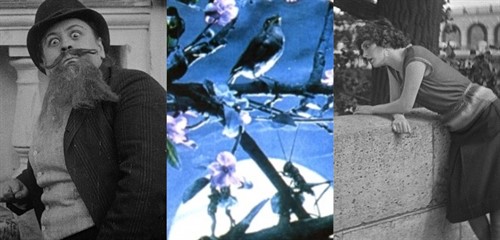Il Cinema Ritrovato On Tour Opening Program

Il Cinema Ritrovato On Tour Opening Program
FREE Opening Night Program
This program is free with a reception to follow.
Featuring three Germaine Dulac Illustrated Records (1930) + The Voice of the Nightingale (1923) + Patouillard Has a Jealous Wife (1912)
Thursday, February 15 at 7:00pm
Highlighting restored, archival, and silent cinema from Il Cinema Ritrovato's annual festival in Bologna, Italy.
About Germaine Dulac Illustrated Records
France | Directed by Germaine Dulac | Courtesy Fondation Jérôme Seydoux-Pathé
Celles qui s’en font | 1930 | 8 min.
Ceux qui ne s’en font pas | 1930 | 8 min.
Un peu de rêve sur le faubourg | 1930 | 11 min.
This program includes three short “music videos,” or “chansons illustrées” (illustrated songs), directed by the incredible Germaine Dulac. Featuring French melodies sung by popular women performers, like Fréhel and Damia, Dulac’s discs reveal social concerns of the period as well as the director’s stylistic penchant for “pure cinema.”
In 1930, the year that marked the French film industry’s total conversion to sound, Dulac directed six “illustrated records.” These “music videos,” or post-synchronized silent films, were designed to accompany a variety of classical and popular music recordings. We include three of six in this program of short films.
Several of these films featured French melodies by popular women singers, like Fréhel and Damia. In keeping with the social concerns of the period, and Dulac’s penchant for a “pure cinema,” most of these films were shot on location. They also featured working-class subjects in provincial settings as they carried out their daily lives and reflected, with hope or despair, on the possibility of achieving their dreams. —Tami Williams (edited)
Shot in the summer of 1930, the films were released in theaters in 1931. The promotional goal was to have the public purchase the records at the same time as the films were released, but this alliance between the record industry and the cinema, as envisaged by Dulac, was somewhat disrupted. The films were also considered poor by the production company, which no longer seemed to support Dulac in the venture, and one finds no evidence of these showings in the press. The archives of Germaine Dulac, held at the Cinémathèque française, have helped fill this gap, and are particularly illuminating on the reconstruction that had to be carried out to recover the synchronization desired at the time. —Manon Billaut (edited)
The restorations carried out by the Fondation Jérôme Seydoux-Pathé in 2023 were based on the original nitrate negatives held in its collections. 4K work carried out at the L'Image Retrouvée laboratory, with the support of the CNC.
These films are courtesy of The Jérôme Seydoux-Pathé Foundation:
CELLES QUI S’EN FONT | CEUX QUI NE S’EN FONT PAS | UN PEU DE RÊVE SUR LE FAUBOURG
About The Voice of the Nightingale
France | Directed by Ladislas Starevich (Wladyslaw Starewicz) | 1923 | 12 min
With live accompaniment by Molly Raben
A pioneer of puppet animation, Ladislas Starevich found himself in France at the beginning of the 1920s, having fled Russia after the revolution. Like many emigrants, he had to find his place in the film business anew and began producing films in his family’s home studio with his wife Anna and two daughters, Irène and Jeanne (aka Nina Star). The lighthearted animated fairy-tale La Voix du rossignol tells the story of a nightingale who is captured by a little girl (played by Nina Star). While the girl sleeps, the nightingale sings to her a song of how he dreams of being reunited with his beloved. The girl sets the nightingale free, and the bird repays her by lending her its voice.
The film combines animated birds and insects (the latter a hallmark of Starevich’s first animated films made in the 1910s) with live actors. Featuring both toning and stencil color, La Voix du rossignol brought Starevich worldwide recognition and won him the Hugo Riesenfeld Gold Medal for the "most novel" short film of the year after it was shown in the US in 1925. —Elena Barysheva
This film is courtesy of the Museum of Modern Art (MoMA).
The Voice of the Nightingale
About Patouillard Has a Jealous Wife
France | Directed by Roméo Bosetti | 1912 | 6 min
This film has it all: cross-dressing, marital conflict, and the great Sarah Duhamel! When Patouillard (Paul Bertho) goes out alone, his jealous wife (Duhamel) is hot on his trail. She disguises herself as a man, leading to a confrontation that escalates in a chase scene and culminates on an industrial crane. Despite its familiar premise, everything about this film is remarkable in its execution. Mme Patouillard’s disguise is so convincing that even we almost didn’t recognize her!
Although Duhamel and Paul Bertho often teamed up at Pathé under the direction of Romeo Bosetti, this film (clearly shot in Nice) is not a Pathé Nizza/Comica production, but a Lux film. We also see the same trio together at work for yet another company, Éclair, in Gavroche à Luna-Park on this disc. —Elif Rongen-Kaynakçi
This film is courtesy of Kino Lorber
PATOUILLARD HAS A JEALOUS WIFE
Returning to the Twin Cities for a second year, Il Cinema Ritrovato on Tour presents rare, restored, and recovered archival cinema. Il Cinema Ritrovato On Tour–Minneapolis will screen films at The Main Cinema from February 15–17, 2024. Closing night (February 18) will take place at the Heights Theater and will feature a new restoration of Ernst Lubitsch’s take on an Oscar Wilde classic, Lady Windermere’s Fan.
Presented in partnership by Archives on Screen, Twin Cities, MSP Film Society, and Cineteca di Bologna, the festival will screen highlights from Il Cinema Ritrovato’s 2023 lineup. Il Cinema Ritrovato is an annual international film festival that exhibits new restorations and archival films in Bologna, Italy.
Archives on Screen is proud to partner with Il Cinema Ritrovato and Cineteca di Bologna to curate selections from their festival for Twin Cities audiences.